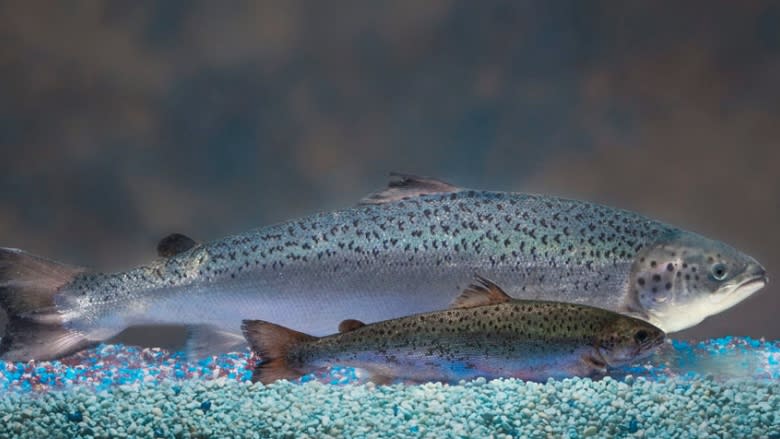 Daily Brew
Daily BrewGMO salmon’s U.S. approval depends on Canadian court case

U.S. regulators have declared a genetically modified salmon created in Canada safe for human consumption, making it the first transgenic animal ever approved for use as food.
But whether the altered fish ever appears on an American dinner plate hinges on a legal battle now before a Canadian judge.
The environmental groups EcoJustice, the Ecology Action Centre and Living Oceans are suing the federal government over its approval of the commercial egg production in Prince Edward Island.
They contend Environment Canada violated federal statutes in what was a highly secretive approval process.
“The government wouldn’t even tell us what they were doing,” says Karen Wristen, executive director of B.C.-based Living Oceans.
“The thought that we could approve the world’s first genetically modified food animal for commercial production in a modern parliamentary democracy without anyone even knowing is, to me, mind-boggling.”
Their main focus of concern is the harm the engineered salmon, dubbed “Frankenfish” by opponents, could cause in the wild if they were to escape from the facility in PEI where the salmon eggs are produced.
“The likelihood of escape may be low but if it happens, the consequences are devastating and uncontrollable,” Wristen tells Yahoo Canada News.
The groups want a Federal Court judge to overturn the government approval of the facility.
Environment Canada has said that a thorough risk assessment was undertaken.
The case was heard during a one-day hearing earlier this week. The judge reserved the decision.
AquAdvantage salmon was developed at Memorial University and the University of Toronto and the licence sold to Massachussetts-based AquaBounty Technologies in 1996.
It consists of an Atlantic salmon egg containing genes from Chinook salmon and an eel-like fish called the ocean pout. The addition of these genes allow the engineered salmon to grow year-round, reaching harvest size in about 18 months, as opposed to three years for conventional farmed Atlantic salmon.
AquaBounty received federal government approval two years ago to produce the eggs for commercial export in PEI. The fish are then reared in fish farms in Panama.
And that is the specific arrangement approved by the U.S. Food and Drug Administration.
“The approval does not allow AquAdvantage Salmon to be bred or raised in the United States,” the FDA says in announcing the approval.
“In fact, under this approval, no other facilities or locations, in the United States or elsewhere, are authorized for breeding or raising AquAdvantage Salmon that are intended for marketing as food to U.S. consumers.”
The approval does not extend to any other facilities, Wristen highlights.
“So if the court sets aside the approval in Canada, AquaBounty is still at square one and the fish is not coming into anybody’s market any time soon,” she says.
AquaBounty Technologies Inc., which has also sought approval for GMO salmon consumption in Canada, declined a request for an interview.
In a statement announcing the FDA approval, company CEO Ronald Stotish says the engineered salmon is a “game changer.”
He says it is an environmentally responsible product that does less damage to the ocean and marine habitats than conventional salmon farming because the fish are reared in land-based facilities.
“Through greater efficiency and localized production, AquaBounty's AquAdvantage Salmon increases productivity while reducing costs and the environmental impacts associated with current salmon farming operations,” he says.
“Importantly, it offers an alternative approach to fish farming that does not exploit the oceans.”
Tampering with nature
Opponents of GMO foods fear the consequences of tampering with nature.
“There’s no science yet that suggests that it is definitely a health concern. We haven’t done the long-term studies on human consumption of GMOs to know,” Wristen says.
Critics of genetic engineering are fighting for mandatory labelling in Canada and the United States, to distinguish GMO foods on grocery shelves. Neither country currently has mandatory labelling.
The primary arguments in favour of genetic engineering are that it could result in greater resistance to pests and disease and more nutritious food from less land.
“By inserting genes into crops such as rice and wheat, we can increase their food value,” notes a background paper by the United Nations Food and Agriculture Organization.
Genetically engineered fruits and vegetables are abundant on grocery stores shelves but the made-in-Canada salmon is the first transgenic animal in the world approved for human consumption.
It’s unlikely to be the last.
While many companies around the world that were pursuing engineered salmon have abandoned efforts due to the controversy, several continue to conduct genetic research on about three dozen species.
AquaBounty itself has said it is working on tilapia, trout and shrimp versions of the technology.



